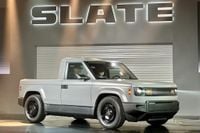On April 24, 2025, Slate Auto, a new electric vehicle startup backed by Jeff Bezos, unveiled its first product: a compact, bare-bones electric pickup truck named the "blank Slate." This innovative vehicle is designed to be both affordable and customizable, with a starting price of $27,500 (approximately CAD 38,000) or under $20,000 (about CAD 27,750) after U.S. federal incentives. The simplicity and modularity of the Slate pickup aim to attract a diverse range of customers looking for an economical electric option.
The blank Slate is a two-seat regular-cab pickup truck that can be converted into a five-seat SUV. Its minimalist design includes steel wheels, crank windows, and no touchscreen—owners can use their smartphones for infotainment via a mount and charger. The vehicle's interior is stripped down to the essentials, aligning with Slate's philosophy of reducing unnecessary features to cut costs and enhance reliability. As Slate CEO Chris Barman stated, "The definition of what’s affordable is broken," emphasizing the need for a vehicle that meets real customer needs.
With a length of 4,435 mm (174.6 inches), width of 1,793 mm (70.6 inches), and height of 1,760 mm (69.3 inches), the blank Slate is notably smaller than many contemporary pickups. It boasts a payload capacity of 635 kg (1,400 lbs) and is equipped with a 198-litre frunk and a 1,048-litre box. The rear-drive format is powered by a 52.7-kWh battery, delivering 201 horsepower and 195 lb-ft of torque. This powertrain allows the vehicle to accelerate from zero to 96 km/h (60 mph) in eight seconds and reach a top speed of 144 km/h (90 mph). Furthermore, the Slate can tow up to 454 kg (1,000 lbs), making it a practical choice for light-duty tasks.
Charging times are competitive, with a Level 2 home charger capable of fully charging the battery from 20% to 100% in under five hours. For those on the go, a Level 3 120-kW DC fast charger can charge the battery from 20% to 80% in less than 30 minutes. Slate Auto also plans to offer an optional 84.3-kWh battery, which will increase the driving range to 384 km (approximately 239 miles), appealing to those needing longer-range capabilities.
Customization is a key feature of the blank Slate, with over 100 accessories available for purchase, allowing customers to personalize their vehicles extensively. Options include body wraps, custom grilles, bumpers, and interior upgrades like sound bars. Customers can choose from pre-packaged kits tailored for specific uses, such as the "Beach Bound" package, which features an open-air design with no doors or roof, or "The Doer," which comes with a kitted-out utility bed. This approach is reminiscent of how consumers can modify home computers, offering a DIY ethos that resonates with a younger audience.
Despite its appeal, the Slate pickup enters a competitive market. After experiencing rapid growth between 2019 and 2023, electric vehicle sales have slowed significantly due to high prices. According to McKinsey & Co., the average EV buyer spends about $55,000 after considering MSRP, options, and incentives. With many EVs currently priced between $30,000 and $40,000, Slate's pricing strategy aims to disrupt this trend.
Industry experts believe that affordable EVs are crucial for stimulating demand. Phillip Kampshoff, co-founder of McKinsey’s Center for Future Mobility, stated, "You have to be able to sell cheap EVs" to trigger the next surge in demand. While established brands like Ford and Tesla are working to introduce more affordable models, Slate's approach focuses on extreme cost-cutting and customization.
In addition to its competitive pricing, Slate Auto plans to leverage the marketing power of Amazon, which could significantly enhance its visibility in the marketplace. The company is set to begin production in a new facility in Indiana, with expectations to produce up to 150,000 electric pickups annually. Deliveries are anticipated to start in late 2026, with advance reservations already open for a refundable deposit of $50.
However, some analysts express skepticism about the viability of Slate's model. Sam Fiorani, lead analyst at AutoForecast Solutions, cautioned that while the market for affordable EVs is promising, the company must address the practical needs of its target audience. Many potential buyers may lack the ability to charge at home, which could deter them from purchasing an EV, regardless of its price.
As Slate Auto embarks on this ambitious journey, it represents a significant shift in the electric vehicle landscape. By prioritizing affordability, simplicity, and customization, the company is poised to attract a new demographic of EV buyers who are eager for a practical, budget-friendly option. With its unique approach, the blank Slate could redefine what consumers expect from electric pickups, paving the way for a new era of accessible electric mobility.
In conclusion, Slate Auto's introduction of the blank Slate pickup truck marks a bold step toward making electric vehicles more accessible to the average consumer. With its innovative design, competitive pricing, and extensive customization options, the blank Slate could very well become a game-changer in the EV market.



